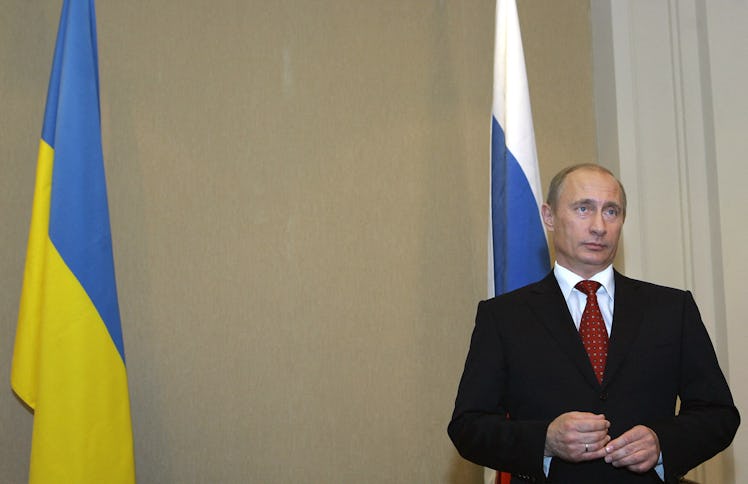
Here's Why It's Such A Huge Deal To Ban Russia From SWIFT After The Ukraine Invasion
As conflict continues, all eyes are on one sanction.
After Russian President Vladimir Putin launched a “special military operation” and initiated the invasion of Ukraine on Thursday, Feb. 24, President Biden condemned his actions by announcing new sanctions against Russia that same day. The sanctions have been met with mixed reviews, especially because at first, they did not include Russia’s removal from the SWIFT financial system. So what exactly is SWIFT banking, and why is it making Russian sanctions after the country’s Ukraine operation complicated? Here’s what you need to know.
If you didn’t know, international sanctions are political and economic decisions made by other countries or multilateral and regional organizations with the purpose of protecting national security interests, international law, and more. In a speech delivered from the White House on Feb. 24, President Biden revealed the sanctions will be “new limitations on what can be exported to Russia. This is going to impose severe costs on the Russian economy, both immediately and over time.” Biden also called Putin actions as “the aggressor” as the reason why Russia will have to “bear the consequences.”
The initial sanctions target two large Russian banks called VTB and Sberbank, a few major Russian elites, and more, in an attempt to economically stunt the country. However, the initial choice to let Russia remain as part of the Society for Worldwide Interbank Financial Telecommunication, or SWIFT, left more than a few people scratching their heads, due to the even greater impact the removal could have on the country’s economy.
However, on the evening of Saturday, Feb. 26, international leaders shared that they would, in fact, remove certain Russian banks from the international system, which allows financial institutions to participate in the global economy. “We commit to ensuring that selected Russian banks are removed from the SWIFT messaging system,” read a joint statement from leaders of the European Commission, France, Germany, Italy, the United Kingdom, Canada, and the United States. “This will ensure that these banks are disconnected from the international financial system and harm their ability to operate globally.” It was not immediately clear which Russian banks would be impacted by the decision.
So why is kicking Russia out of SWIFT such a massive play, and what could happen under these sanctions? Let’s break it down.
What Is SWIFT Banking?
According to NBC News, SWIFT banking is a “cooperative of financial institutions” founded in 1973 that operates out of Belgium. SWIFT monitors over 11,000 financial institutions in more than 200 countries and territories, and is overseen by the National Bank of Belgium, as well as other major banks, including the US Federal Reserve System, the European Central Bank, the Bank of England, and more.
But SWIFT isn’t your average bank — it actually acts as a “secure messaging system” by alerting banks when transactions are about to occur. In an interview with NPR, executive director of the Davis Center for Russian and Eurasian Studies at Harvard University Alexandra Vacroux explained that SWIFT’s job is not to “move the money,” but rather to move “the information about the money.”
SWIFT reportedly received an average of 42 million messages a day in 2021, according to Bloomberg.
What Will Happen With Russian Banks Kicked Out Of SWIFT?
According to NBC News, removing Russia from SWIFT entirely would cut the country off from “most international financial transactions.” Most notably, Russia would not be able to profit from oil and gas production, which makes up 40% of the country’s profits, and therefore the removal would come as both an immediate hit and long-term hit to the country’s economy.
NBC News claims kicking Russia out of SWIFT would be “one of the toughest financial steps they could take.”
Why Was SWIFT Initially Left Out Of The Sanctions?
When asked by reporters why Russia was, as of Feb. 24, allowed to remain a part of SWIFT, President Biden responded, “The sanctions we’ve imposed exceed SWIFT. The sanctions we’ve imposed exceed anything that’s ever been done. The sanctions we’ve imposed have generated 2/3 of the world joining us. They are profound sanctions.”
Though he was very adamant in his initial decision not to remove Russia from SWIFT, Biden also made it seem like the possibility of imposing even harsher economic sanctions wasn’t completely off the table just yet. “Let’s have a conversation in another month or so to see if [the sanctions] are working,” said Biden. Clearly, things moved faster than that — and it remains to be seen what happens next.
Editor’s Note: This story has been updated to include the Feb. 26 announcement that certain Russian banks would be removed from the SWIFT international banking system.
This article was originally published on